Featured
Fuel Subsidy Removal: Tinubu Charts Clear Path for Economy Revival
Published
2 years agoon
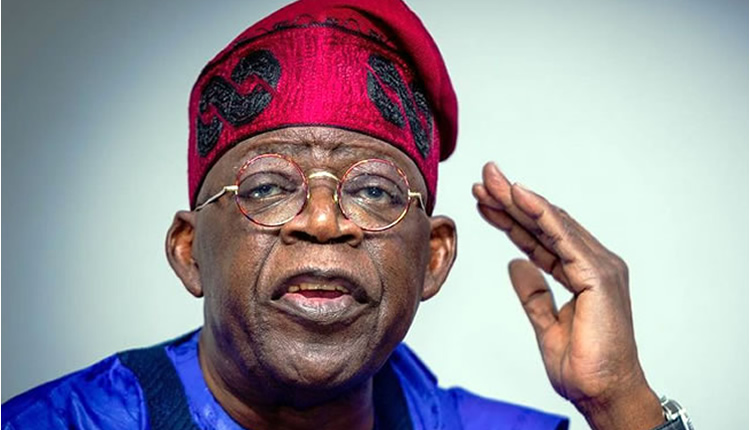
Barely a week after the formal announcement of the removal of the petroleum subsidy by the President, Asiwaju Bola Ahmed Tinubu, Nigerians have started living with the reality and assessing its full benefits.
The pall of uncertainty that followed the inaugural day declaration have since palled away, giving rise to total optimism.
While the President gave a hint of hope when he told the APC Governors that the present N30,000 minimum wage for civil servants would be reviewed upwards, many State Governors have started working out palliatives for the people of their States.
While the petroleum products markets panickily responded arbitrarily to the announcement by outrightly jerking up the pump, closure of sales, and hoarding in some instance, the various strategic moves of the Federal Government eased off the tension created by the panic responses to the stoppage.
After years of dilly-dally by successive administrations, President Bola Ahmed Tinubu found the exceptional courage to announce the full removal of subsidy payments on the popular Premium Motor Spirit (PMS).
Subsidy payments on petroleum fuel has been digging a huge hole in the nation’s economy since the regime of the Military President, General Ibrahim Badamasi Babangida(Retd). The government has shut down all the four refineries in the country, (two in Port Harcourt, Rivers State, one in Warri, Delta State and one in Kaduna, Kaduna State) for a proposed Turn Around Maintenance (TAM). And to meet the local consumption, the government issued licences to the Nigerian National Petroleum Corporation (NNPC) and some others called independent marketers to import fuel. And from there, the regime of subsidy started.
Successive administrations have mulled the stoppage of subsidy regime, but mostly lacking the political will to do so. The nation have heard of several partial withdrawal several times, thus creating mistrusts and confusing in the administration of the subsidy payments.
Regime of heavy subsidies on petroleum products and power have driven some countries into economic perdition. The government due to IMF anf World Bank’s advice had earlier removed subsidies on kerosine and diesel oil, while that of power was removed some two years ago. Angola too is toiling the route. The country, like Nigeria, Angola too has cuts petrol subsidy ‘to promote economic growth’
To further ameliorate the impact on the populace, the Federal House of Representatives has urged the FG to provide gas-powered buses across the country to mitigate effect of petrol subsidy crisis
Also, a former President of the NLC and also Governor of Edo State, Adams Oshiomhole is however optimistic that the President, Bola Tinubu will pull through, as he has an immediate solution to cushion the consequential effect of the subsidy removal.
The former governor expressed confidence that issues arising from the removal of fuel subsidy will be quickly resolved between the Federal Government and the organized labour.
Oshiomole, now a Senator elect, stated, while speaking in an interview with Channels Television’s Sunday Politics, that Tinubu recognizes the impact the withdrawal of fuel subsidy is having on Nigerians and is determined to take immediate action to cushion it.
He said, “This president recognizes that the effect of the withdrawal is already here, people are already going through some level of discomfort and therefore there has to be an immediate solution to it.
“Now that immediate solution is what we discussed and the fact that we are meeting on Tuesday again shows that clearly, we realize that this is not one of those things you want to buy time because it has a real negative impact, on particularly, the most vulnerable group.
“But we have a solution to it because you are going to make savings, so take from that savings or even if it is borrowing.
“So, whatever it is, you can leverage some revenue and improve wages to cushion the cost of living, I think it is legitimate, I think it is doable, it is not something that you want to spend two to three months negotiating,” he said.
Oshiomole, who is a former president of the Nigeria Labour Congress (NUC), was part of a meeting between the Federal Government and the Trade Union Congress (TUC) between Sunday and late Monday (5 June 2023) evening.
He disclosed that the meetings were productive, adding that the government will consider all the demands by the TUC and revert on Tuesday.
Oshiomole said if Nigeria can save about N7 trillion by ending subsidy, the Federal Government can take part of that money and put in the wage sector.
He said, “This is possible because those savings will go into the federation account which will be distributed among the three tiers of government and so every tier of government will have more money and should be able to meet the consequential increase in wages.”
Also, one of the big four consulting firms in the world, PricewaterhouseCoopers,has identified post-subsidy palliatives that the Federal Government can implement to mitigate the effect of the petrol subsidy removal.
In its recent report, titled, ‘Fuel Subsidy in Nigeria — Issues, Challenges, and the Way Forward’, PwC said minimum wage increase, high tax exemption, and the provision of foreign exchange (FX) to importers of diesel, can help curtail the shocks of subsidy removal.
Proposing possible remedies to the subsidy removal crisis, PwC asked the federal government to fully deregulate the downstream sector and completely stop the under-recovery payments.
The company also backing the government’s decision to scrap subsidy on petrol, suggested the provision of credible, evidence-based palliatives.
“It is not the poorest people in villages that will be most impacted as they normally have very limited touch points with petrol consumption (they move around by trekking or using bicycles to their farms, shops, and market with only a very few owning motorcycles or vehicles),” the report reads.
“The recommended palliatives are an increase in the minimum wage — this will ensure that there is support by workers and limit the resistance by the labour union.
“Increase in the monthly income threshold for PAYE exemption purposes — currently N30,000 per month is exempted from PAYE which can be increased to at least N50,000 per month. This will give extra cash to the employed poor on a monthly basis to cushion the impact of subsidy removal on them. Also, small business owners will benefit by way of higher tax exemption on their equivalent profits for direct assessment.”
The firm also said the government should guarantee the provision of foreign exchange (FX) to importers of diesel at “the official exchange rate using the FX savings from the current fictitious petrol consumption that will be eliminated when the subsidy is removed”.
This, PwC said, would bring the pump price of diesel down significantly and in turn moderate the inflationary impact of the petrol price increase.
While the minimum wage increase and high tax exemption threshold will affect the revenue of states, PwC said the higher revenue to be shared from subsidy savings “will more than compensate”.
“The additional benefit of this proposal is that it can be implemented within a short period of time at a manageable cost while protecting the most vulnerable population in a sustainable manner without being prone to corruption,” the consulting firm said.
Meanwhile, the country is currently experiencing post-subsidy realities after President Bola Tinubu announced that the petrol subsidy has been removed. However, with the expected coming on stream of the newly inaugurated Dangote Refinery in Lekki corridor, Lagos State, there is huge hopes that the prices of the commodity would soon drop drastically.
The Oil Producing and Exporting Countries, OPEC+ has also further extends production cuts, adjusts Nigeria’s output to 1.38m bpd to shore up the market price.
©www.focusmagazineonline.com (2023)
You may like
-


Beyond the Fall: Seeing the Strength in Mr President, Asiwaju Bola Tinubu
-
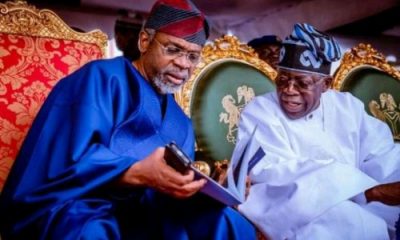

BREAKING: Tinubu Appoints Gbajabiamila As Chief Of Staff, Akume SGF
-
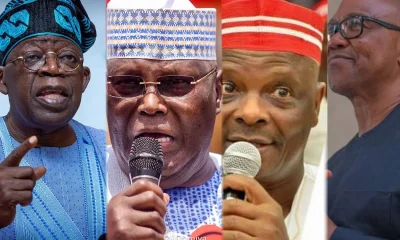

2023 Presidential Election: Tinubu leads Atiku, Obi in Battle for the Soul of Nigeria
-
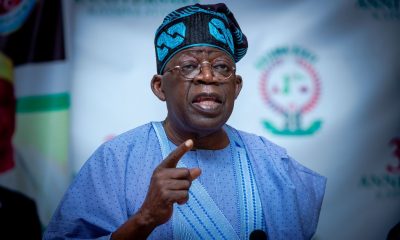

Day Tinubu Unveils His Economic Agenda By Tope Fasua
-
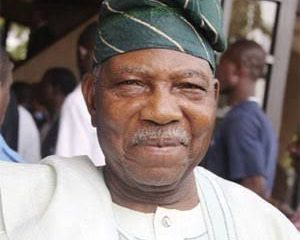

Yoruba Ronu Lauds Fasoranti over Endorsement of Bola Tinubu
-


Oshogbo agog for Tinubu, Shettima as Oyetola lead a 11km-walk
Featured
Osun Politics: Aregbesola Grappling in The Dark Alley…
Published
2 months agoon
November 30, 2024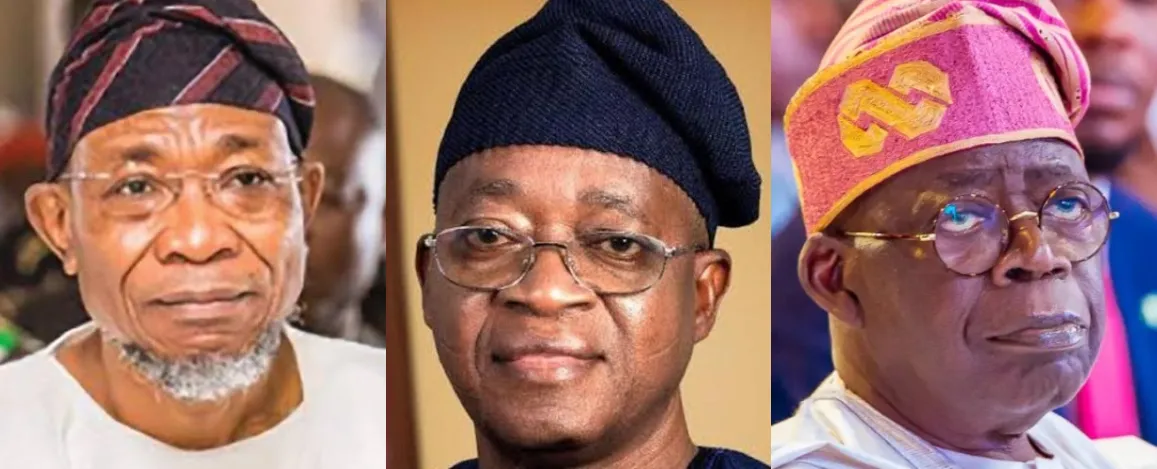
Battles Odds For Survival
Ogbeni Rauf Adesoji Aregbesola, an iconoclastic political strategist, a former Executive Governor of Osun State and also a former Minister of the Interior Affairs has bluntly refused to comment on the political turbulence he is facing both in his State, Osun, and Lagos, where he had a very strong hold on the political structure in Alimosho local government and more particularly, his well-publicized rift with President Asiwaju Bola Ahmed Tinubu.
But one of his right-hand man, who preferred anonymity in a matter of fact, declared that the “door to any reconciliation is closed, finally”.
The associate can actually feel undone by his party’s treatments of Ogbeni Aregbesola and his supporters. They were first expelled by the Osun State chapter in August 2023 by the State Executive Committee of the party.
The State Executive Committee had risen from its meeting and announced the suspension of another set of senior members believed to be supporters and followers of the one-time governor of the State and Internal Affairs Minister, Rauf Aregbesola. Prominent figures on the new list includes the former Secretary to the State Government, Mr. Moshood Adeoti, a former Speaker, Osun State House of Assembly, Hon. Nojeem Salami, a former member of the House of Representatives, who was the Senatorial candidate of the party in Osun East Senatorial District, in the last general election, Hon. Francis Famurewa, and a former Special Adviser to governor Aregbesola, Mr. Kunle Ige, and twenty-two other senior members of the party across the State.
But in a swift reaction then, Mr. Kunle Ige, had dismissed the suspension saying “it is irrelevant and stupid. They can’t even follow common due process. They are destroying the party.
I haven’t been home (Esa Oke) in ages. Since the last election, so where was the anti-party activity? I wasn’t even home (Esa Oke) for the last election. They don’t even think”, he queried.
According to Kunle Ige, the best thing is to “ignore them completely. I don’t have the time for their nonsense”
However, the gale of suspensions were alleged to be a direct response to the launching of the Omoluabi Caucus by the former governor, Aregbesola, in his country home in Ilesa.
While the suspension or expulsion of August 2023 seemed to have died down, another one suddenly erupted in October, 2024. This time around, Ogbeni Aregbesola himself was suspended from the party. And more, he was to face a disciplinary committee for his alleged infractions.
However, this is not the best of time for the political maverick, Ogbeni Aregbesola. His political trajectory from his time at the robustly influential Works Ministry in Lagos State, two-time Executive Governor of Osun State, and lastly, Interior Ministry overseer, attest much to his status as a charismatic grassroots political mobilizer; a man passionately loved by his people, but with an eccentric bend.
While he held sway in Lagos, he built a fortress around himself in the Alimosho local government, the celebrated largest local government area in the country. He controlled the political pulse of the area. And also, was the Alpha and Omega in the larger political empire of Asiwaju Bola Ahmed Tinubu. He simply filled the role of a “Mr. Fix It”. He was both de facto and de jure alta ego of Asiwaju Bola Ahmed Tinubu.
But presently, the man widely acknowledged as “Mr. Fix It” among the progressives clan is in a political quandary; he is simply at a political cross-road. His weird eccentricity has impacted much on his decisions and actions.
Now Ogbeni Aregbesola himself is in a fix politically. He is said to be nursing either a senatorial ambition from the Osun East (Ife/Ijesa) Senatorial district or if the new party in the offing comes alive, a vice presidential slot with Mallam Nasir El Rufai. But while he gropes for just anything to hang on to for safety in the dark alleys the bitter divorce with Asiwaju Bola Tinubu and the Bourdillion’s political family, has thrown him into, his supporters were still incorrigibly optimistic about his chances of clinging either of the two positions.
But the political road is dark, the coast is very bleak. He is very familiar with all the intrigues and cut throat shenanigans in political circle. He was the Lord in Tinubu’s political empire at a point. He knew the door to his familiar terrain in the All Progressives Congress (APC) might have been permanently shut against him. After all, he witnessed the door being shut against some of his erstwhile colleagues while serving as the Commissioner for Works and Infrastructure in Lagos State.
A member of the Governing Advisory Council (GAC) in Lagos State, who spoke to our correspondent, asked rhetorically recently in an interview with www.focusmagazineonline.com that “of the more than twenty Commissioners, who served under Tinubu with Aregbesola, how many can confidently raise their hands up and still stand by him?
He continued, “the downfall of these men were largely the scheming and shenanigans traceable to Ogbeni Aregbesola. Even the former Governor Akinwunmi Ambode would not forgive him in an hurry”, he said.
Now, the Apha Ogbeni Rauf, is in a quandary himself. He cannot break the barrier erected against him in Tinubu’s empire or APC. He finds it extremely difficult to co-habit with the uninspiring Adeleke Ademola in the Peoples Democratic Party (PDP), the Labour Party is an amnesia to him, yet he has the ambition of going to the Senate or running as a Vice President. Hence the option of a new political party. The new party according to proponents will be national in outlook and is expected to push both the ruling APC and PDP into the limits.
www.focusmagazineonline.com can recalled that Ogbeni Aregbesola, at a point was effectively, the de facto Asiwaju Ahmed Bola Tinubu’s alter ego. in the group, he decided what happened and who got what, in short, he called the shots. And in the words of an All Progressives Congress (APC) leader in Lagos State, the common refrain then in Bourdillion, Tinubu’s residence and political headquarters, was: “go and see Rauf”.
According to the member of the GAC, who preferred anonymity, whatever happened, or who got what or became what, be it in the Governing Advisory Council (GAC), the apex committee overseeing the affairs of Lagos State Government by proxy, were decided mainly by Ogbeni Aregbesola. He was said to have promoted, demoted, terminated, even truncated many political ambitions while his grips on Bourdillion lasted. His imprimatur were said to be everywhere. But not anymore.
Perhaps, his present travails allegedly started from his closeness, roles and actions as Tinubu’s alter ego. As the associate believed that “many around Asiwaju weren’t comfortable with Rauf being so close to Asiwaju… and thus sponsor and even encouraged the division”.
The first signal was the dissolution of the Mandate Group in Lagos. The Group was formed by the core loyalists of Bola Tinubu, the then Executive Governor of Lagos State. Ogbeni Aregbesola was largely in control. By 2017, he had installed his protégé, Alhaji Abdullahi Ayinde Enilolobo as the Apex leader. Suddenly the group, alongside others like Justice Forum and BATCO were dissolved by fiat by the party’s leadership.
However, Ogbeni Aregbesola’s followers in Osun traced his disagreements with the leadership of the Tinubu’s political hegemony to the succession politics in Osun State when his tenure as a two time Executive Governor was rounding up in 2017. Sources in Oshogbo, Osun State, Aregbesola was said to have insisted in having Alhaji Moshood Adeoti, from Iwo Local Government of Osun West Senatorial District as his successor. Thus he plainly explained to Tinubu. But Tinubu was alleged to have preferred his cousin, Mr. Adegboyega Oyetola from Iragbiji, in Boripe Local Government Area, Osun West Senatorial zone of Osun State. From this point, the loggerhead between the two political gladiators was said to have taken its roots. Asiwaju was said to started distrusting Ogbeni and started “feeling that he was becoming a threat to his ambition”.
Aregbesola was said to have grudgingly accepted to work for Gboyega Oyetola at the polls during the 2018 out of circle governorship election in Osun State. Oyetola had emerged victorious after a most rancorous election ever that ended with re-run in four words of Ile Ife, Orolu, and Oshogbo returned him with a margin of less than 500 votes.
In the said election, Aregbesola’s anointed candidate, Moshood Adeoti with hordes of his supporters had mass-moved into another political platform, the Action Democrats Party (ADP). Alhaji Moshood Adeoti cornered the over fifty thousand votes from the Iwo axis, but performed poorly in all other local governments. He came a distant fourth behind Oyetola, Adeleke, and Omisore.
Aregbesola, the master political strategist, took good notice of these returns from the elections. He waited patiently, observing the various take home from the off-cycle election, while looking for the right time to strike. He needed to exact his revenge and teach his former leader some political lessons.
The former eccentric governor started his vengeance war with the ministerial nomination for the State. He was said to have stunted both the nominations of Asiwaju Bola Tinubu and another elder of the party, Chief Bisi Akande, to emerge the Interior Affairs Minister during the second term of former President Muhammadu Buhari’s tenure. He was alleged to have used another eccentric political strategist up North, Mallam Nasir El Rufai to clinch the slot. With his emergence as a Minister, he was said to have clearly drawn the battle line with his political block. And from there, he brooks no odds. He started creating his platform, well outside the Bola Tinubu’s or APC’s blocks.
First step was the launching of the True Osun Progressives group (TOP), then the Omoloabi Forum within the State APC. These groups were essentially made up of notable foot soldiers of APC in Osun State, but who were fiercely loyal to Ogbeni Aregbesola. The twin group quickly spread across all the thirty-three local governments in the State. The State Government under Mr. Oyetola was said to have been seriously rattled by the emergence and spread of TOP in the State. The party also panicked. Known members of Aregbesola’s government were the leaders.
While the newly formed TOP and Omoluabi groups could not wrestle the governorship ticket from Oyetola during party’s primary leading to the 2022 off-cycle governorship election in the State, they quickly drew back and withdrawn from the party’s activities. When they re-emerged, it was with the opposition candidate, Mr. Ademola Adeleke.
The experience of the 2018 election that pitied Aregbesola’s candidate, Alhaji Moshood Adeoti of ADP with Iyiola Omisore of SDP, Jackson Adeleke of PDP and Oyetola of APC together has taught the maverick political strategist a lesson. Obviously, Adeoti cannot pull through if fielded again. Then his next move was shocking. Aregbesola and his troops decided to deployed their political weight behind Ademola Adeleke of the Peoples Democratic Party (PDP). He won.
Not many people were fooled when known acolytes of the former Minister started mobilizing for Adeleke. APC made faint attempt to mend fences. But it was rather too little or too late or both. Efforts by notable personalities, including the renown cleric, Papa Enoch Adejare Adeboye, an Ifewara Ijesaland born General Overseer of the Redeemed Christian Church of God, (RCCG), the Ooni of Ile Ife, Oba Adeyeye Enitan Ogunwusi, and others ended with naught.
Responses to all these attempts to thaw the raging rift were not encouraging. It was apparent by the body languages of the main actors that the two main combatants are done with each other. Asiwaju Bola Ahmed Tinubu seemed apparently, tired of Rauf Adesoji Aregbesola and vice-versa. Nothing seemed pulling the mutual confidence again. Aregbesola became bitter, enraged. And he let loose his anger, albeit, without restrain.
On the day of the election, the Minister was out of the country but apparently was keenly watching and monitoring events from home. But very early the second day, while the results started pouring in and Adeleke of PDP was edging Oyetola clearly in all the local governments, someone in his team haphazardly released a tweet that not few consider irrational. Although the tweet was quickly pulled down and disclaimed, certainly not a few had saved, or screenshot it. The “Osun Le Tente” tweet (Osun on top) will remain in the remembrance of many leaders for a long time to come.
Also, in the lead up to the APC’s presidential primaries, where thirteen aspirants slugged it out with Tinubu for the Presidential ticket, although Aregbesola was not in the fray, yet his hands were prominently seen and felt throughout the campaign.
While the campaign was gathering steam, Aregbesola was in Ijebu Jesa. He needed to meet his TOP members. A woman loyalist who claimed she attended the well-attended meeting recalled to www.focusmagazineonline.com the hard words he deployed while describing Bola Tinubu.
This many damaging rumours that later emanated from the Ijebu Jesa’s meeting apparently hurt Bola Tinubu and his supporters to no end. It was at the period when a picture of him was trending. He had visited a former Military President in his residence in Minna and the paramount ruler of Ijebuland, Awujale of Ijebu Ode, Oba Sikiru Adetona, when for whatever reasons, a patch of wetness was observed on his lower backside when standing up. This was translated by detractors to mean uncontrollable blader, an illness often associated with old age or panicking.
However, Ahmed Tinubu would eventually emerged the winner of the election and inaugurated the sixteenth President of the Federal Republic of Nigeria. And ever since Aregbesola has been in the political wilderness, operating on a thin thread, occasionally test running various strategies to reestablish himself.
He has been seen variously hobnobbing with the government of Ademola Adeleke, the Osun State Governor, and also, had appeared in open drive along major streets both in Oshogbo and Ilesa. But these political stunts were not enough to fetch him any huge dividends.
But while all seemed stable a bit, the Osun State chapter of the APC slammed him with a suspension, over allegations of anti-party activities. The suspension, which takes immediate effect, is pending the outcome of disciplinary proceedings initiated by the state’s party leadership.
The decision to suspend the former Governor followed a request from the Ilesa East Local Government APC Executive Committee, which petitioned the state party chairman, Tajudeen Lawal, to take action against Aregbesola, citing his alleged involvement in actions that undermined the APC as a party.
The committee, in a letter, accused Ogbeni Aregbesola of promoting factionalism and colluding with opposition parties, among other allegations.
Responding to the request, the Osun State APC Executive Committee notified the party’s national leadership, represented by APC National Chairman, Dr. Abdullahi Ganduje, of its decision to suspend Aregbesola and to establish a disciplinary panel to investigate the charges.
The resolution, dated October 22, titled “Resolution Suspending Rauf Aregbesola for Anti-Party Activities and Constituting a Disciplinary Committee,” was signed by Osun APC Chairman Lawal and Secretary Kamar Olabisi. The document outlined the allegations and Aregbesola’s suspension based on Article 21 of the APC Constitution.
“Following complaints of anti-party activities levelled against Ogbeni Rauf Aregbesola by the Ilesa East Local Government Executive Committee, the State Executive Committee (SEC), after reviewing the allegations and in accordance with the powers vested in it by Article 21(3)(vi)(c) of the party’s Constitution, hereby suspends Ogbeni Rauf Aregbesola from the party pending the outcome of an investigation,” the statement partly read.
The charges against Aregbesola include, factionalizing the APC by forming the Omoluabi Caucus splinter group; allegedly collaborating with opposition parties to destabilize the APC in Osun State; publicly criticizing party leaders, including President Bola Tinubu, Chief Bisi Akande, and former Osun Governor, Gboyega Oyetola; refusing to participate in or support APC activities within the state; and refusing to vote for the party since the 2019 general elections.
The committee will deliver its findings and recommendations to the state executive within 14 days. It also issued a formal notice to Aregbesola, inviting him to appear and defend himself against the allegations.
In a follow-up letter dated October 24 and signed by Osun APC Disciplinary Committee Secretary, Waheed Adediran, the former governor was given 48 hours to respond to the allegations in writing.
Sources at the party’s secretariat in Oshogbo revealed to www.focusmagazineonline.com that the former Minister had simply spurned all the letters sent to him.
When www.focusmagazineonline.com contacted him on his WhatsApp contact, for an interview, he simply reply “Thanks. No, please”
Many of his men who were suspended by the Osun chapter of APC however, denied receiving any letter of suspension from the party.
His men in Alimosho, Lagos State were also not willing to talk to the press. Alhaji Abdullahi Ayinde Enilolobo, his man Friday, refused to talk nor comments when contacted. He did not reply to all our messages to him.
But his troops in Osun State are boiling, not relenting in stating his case. Mr. Kunle Ige too was suspended by the party since August of 2023. But he told www.focusmagazineonline.com then that he was not aware of his suspension as he was not officially served any letter suspending him from the party.
However, many of the associates of the former Governor in Oshogbo were particularly irked by the recent developments. One of them, a former senior official of Ogbeni Aregbesola’s government revealed to www.focusmagazineonline.com that he was part of all the reconciliatory efforts to douse the tension between the two combatants, President Bola Tinubu and Ogbeni Aregbesola. But he noted sadly that “it appeared he (President Tinubu) is no longer interested in having Aregbesola around him”
Blunt and bold to a fault, Kunle Ige refused to comment on the suspension of Aregbesola. “No comment on the suspension… that’s their business…”, he blurted out when contacted by www.focusmagazineonline.com.
On the plans by some of Aregbesola’s supporter to announce their new political home this December, a former aide declared that “Ogbeni has not categorically given anybody any date…. But obviously he has his plans for the future politically especially for Osun…. The talk of December is because there is a third party option being planned … which might come on stream then… and it is a national one”.
The aide declared the rumoured adoption of Labour Party (LP) as “rubbish… LP was never was on the cards..”.
When asked pointedly why was it difficult for Aregbesola and Tinubu to settle their rift, considering the fact that Aregbesola was the de facto leader of Tinubu’s political block before the fall out, he insisted that “you should ask Asiwaju that question…”
Another associate who spoke to www.focusmagazineonline.com explained further that it “took Ogbeni a while to realise that they had been waging a war against him since 2017..”
He denied that the feud had its roots in the Moshood Adeoti versus Gboyega Oyetola’s struggle for the succession of Ogbeni Aregbesola. He said “well… certain things are now coming to light that shows that they had wanted to cut him (Ogbeni Aregbesola) to size since then (2017). They just wanted him to finish his term and step aside”.
With a despairing note, he declared that “I think that door (to any reconciliation) is finally closed”.
According to him, “Asiwaju is not interested in any reconciliation, since if he ever was, this wouldn’t have been an issue”.
He revealed that he had “been deeply involved in the past in trying to resolve the rift, but clearly Asiwaju isn’t interested”.
In Osun State, not many supporters of Ogbeni Aregbesola is discreet, about his next political moves. A former local government chairman told www.focusmagazineonline.com angrily that “God willingly by December, our Symbol, Rauf Aregbesola, will unveil the new party we are moving to”.
He also declared that “the people in APC, especially Tinubu, doesn’t need him in the party again, likewise the Oyetola’s camp in Osun. So we leave their party for them”.
www.focusmagazineonline.com ©December 2024
Featured
4 youths Perish in River Osun after Granny’s funerals
Published
2 months agoon
November 12, 2024By
FocusMag
The tranquillity and calmness of the sleepy, but rustic community of Oke Imesi, Ekiti West Local Government, Ekiti State, were ruptured early Sunday morning when four young boys were mysteriously drowned in the River Osun, along the Oke Imesi, Ido Ile and Ikoro road.
The four young boys, aged between 24 and 27, were said to be in the town to attend the final funeral rites of the grandmother of two of them.
When www.focusmagazineonline.com correspondent visited the town, people were seen in groups discussing the ugly incident in hushed tones.
Generally, silence and unease calm pervaded the atmosphere, even up to the Palace of the traditional ruler, Owa Ooye.

Eye witnesses disclosed to www.focusmagazineonline.com that two of the boys, Mr. Gabare and an unidentified friend, had followed their friends, Mr. Samson Anisere and his cousin, Mr. Leye Adeoti, to celebrate the final funeral rites for late Mrs. Anisere, who hailed from Obanla Compound, Oke Imesi.
Our correspondent learnt that the boys decided to go and swim in the river around 11:45 am, since they had decided not to embark on the journey back to Lagos on Sunday. The funerals were done on Saturday, November 9.
All through Monday, the traditional institution of the town were busy with offering of sacrifices and performing all necessary rituals to appease the god of river and to prevent a reoccurring of such ugly incident.
According to tradition, the corpses must be bury by the bank 0f the river and must be done without delay.
Meanwhile, the remains of the four boys were buried by the river’s bank on Monday evening, after consultation with all the families of the bereaved and necessary police report obtained by the community.
www.focusmagazineonline.com ©November, 2024
Featured
Ilobu Community Mourns late COAS, Lagbaja, suspends celebrations
Published
2 months agoon
November 7, 2024By
FocusMag
The passing of the immediate past Chief of Army Staff, Lt. General Taoheed Abiodun Lagbaja has thrown the ancient community of Ilobu, in Irepodun local Government area of Osun State into deep mourning.
“We are downcast and in sorrow. He is not just the son of the soil, but one of the shinning stars of the entire Yoruba race. If you go round the community, you will see a community that is in deep sorrow”, Oba Olaniyan muttered.
The community was in the thick of hosting the 2024 Ilobu Day celebration slated for November 9, when the sad news filtered in that their most prominent son, General Lagbaja has passed in in a private hospital in Lagos, Lagos State.
“Ilobu is a very happy town, but this morning, the sun suddenly snatched away from our sky.”
But in a twist, Oba Olaniyan told newsmen that the Ilobu Development Union executives had an emergency meeting, where they decided that Ilobu Day 2024 celebration be suspended indefinitely.
www.focusmagazineonline.com gathered authoritatively that President Bola Ahmed Tinubu spared nothing to save the live of the gallant infant Officer. He was said to have instructed that all necessary medical facilities should extended to him while on sick bed.
The traditional ruler of Ilobuland, Oba Ashiru Olaniyan, the hometown of late Lt. Gen. Lagbaja, was short of words when a correspondent of the Nigerian News Agency (NAN) visited his palace Tuesday afternoon, shortly after the confirmation of his passing by the Federal Government.
The traditional, who was seen in a deep mourning mood when the NAN correspondent visited his palace in Ilobu, directed the National President of the Ilobu-Asake Development Union, Oluremi Salako, to speak on his behalf.
He said that the town was planning its annual “Ilobu 2024 Day” slated for this coming Saturday (November 9) before the sad news of Lagabaja’s death filtered in.
www.focusmagazineonline.com © November 2024
Trending
-
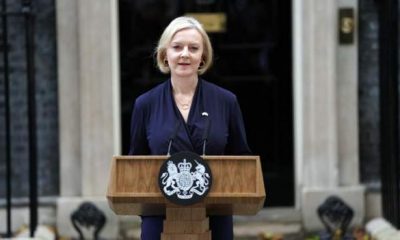
 Main Story2 years ago
Main Story2 years agoBREAKING: Liz Truss resigns as UK prime minister
-

 News2 years ago
News2 years agoSports: Messi misses out on Ballon d’or, Oshoala, Adeyemi in female, junior lists.
-

 Business2 years ago
Business2 years agoCurrency Redesign: Emefiele Unperturbed As Nigerians Groan in Pains
-
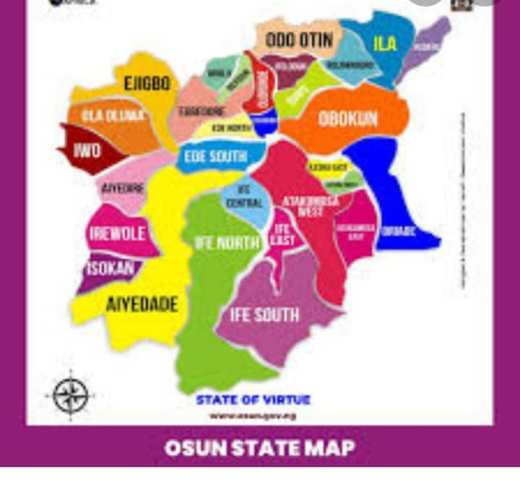
 Featured2 years ago
Featured2 years agoPolitics of Forced Congratulatory Messages Over Osun Guber Election
-
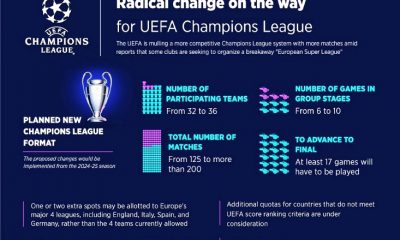
 Sports1 year ago
Sports1 year agoUCL format to change for 24/25 season: groups, knockout, league table
-

 Main Story1 year ago
Main Story1 year agoReal Reasons Makinde Refuses To Announce New Alaafin
-

 News2 years ago
News2 years agoBREAKING: Phyna is BBNaija season 7 winners
-

 Economy2 years ago
Economy2 years agoCBN’s Change of Naira Shocks Nigerians, EFCC Hail Moves Clampdown on Currency Hoarders
